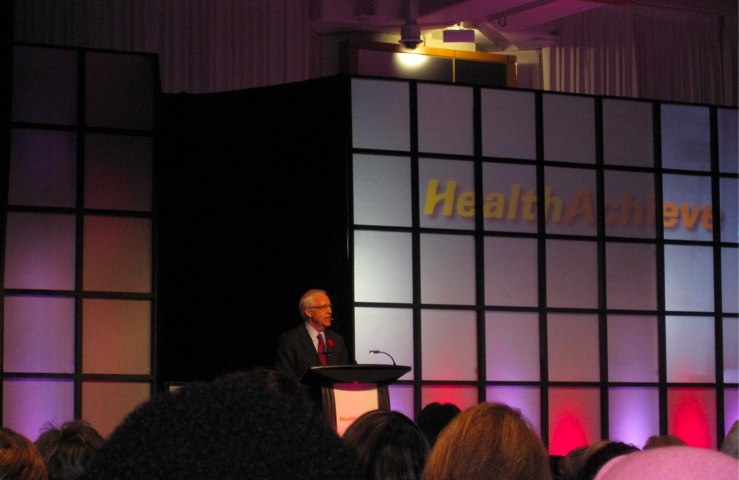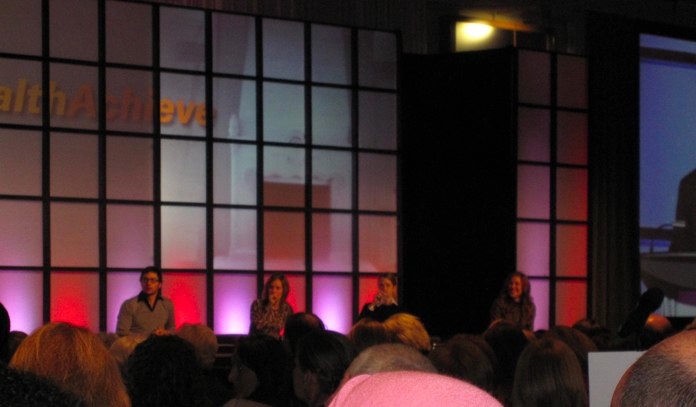This session opened with a video of highlights from the 2010 Vancouver Olympics and Paralympics with the official Olympic song, “I Believe”. Gotta admit that seeing the images again pulled some emotions.
The session was moderated by Brian Williams who started off with an interesting and funny story. He then spoke about the changing attitude in Canada because of the Vancouver Olympics.

The four Olympians who were part of the panel:
- Clara Hughes –
- Lauren Woolstencroft – she won five gold medals at the 2010 Vancouver Paralympics!
- Jenn Heil
- Alexandre Bilodeau

It was in a Q&A format. Here is a summary of the session (some are direct quotes and some are summaries of what was said):
BW: How do you perform under pressure?
CH: never focused on winning a gold, but process of improving and being inspired. While you can’t always win, it’s important to show-up and be your absolute best. Bring it back to yourself and bring it back to your heart. Utilize the energy around you.
LW: amazing to see the change and the focus on sport rather than on disability; great to see media and fans
BW: What do you say about the frustration of not getting the attention?
LW: put a positive spin on things. Remind self of how far things have come. Look at the positive and focus on the evolution and progress.
BW: The issue of being a woman at the elite level. In Turin (2006), 16 of the 24 medals were won by women…
JH: Never raised differently than the boys and fortunate for the opportunities in Canada that aren’t the same in the rest of the world. FastandFemale/BecauseI’mAGirl
BW: On pressure at Vancouver expected to win a gold medal.
JH: Tremendous amount of pressure, but we welcomed it because we were prepared. For the first time, we wanted our athletes to achieve excellence. But, focus on the process, the joy of the sport.
On “gold is yours to lose: JH: Love to try and challenge self. Reframed the question and focused on the positive. You welcome the pressure.
BW: How did you deal with the pressure?
AB: Get prepared both physically and mentally. We were ready to perform our best as we had four years to prepare for those 23 seconds… We were given the resources.
AB: All the athletes were confident leading-up to the events. Everyone was focused but still having fun. Being around the other athletes was motivating.
BW: Talk about Federick
AB: Doing skiing wasn’t my decision, it was my mom’s decision. Playing hockey while growing up with the Duschene boys. Then, my mom decided to do a family sport to stop “drinking slush and eating poutine”. Was inspired by Jean-Luc Brassard in 1994 and then got into moguls.
BW: It’s one thing to prepare in business and sport, but what is it like in the final preparations the night before? How do you deal with the mental part?
CH: The big part is facing yourself, your fears, and your nervousness. Being the flag-bearer is way more stressful than competing because you don’t know how things are. The day before the opening, was able to get the focus based on the other athletes and motivational speakers. Got inspired because I reconnected with that inner-kid in me and by the opportunities and I saw throughout the games y team-mates do the impossible and succeed.
BW: How did you deal with trying to be normal (e.g., sleeping)?
LW: Just reminded about the events leading up to the games and the hours of training, team-mates, and family and everything that allowed me to get there. I’ve done my work and now I just go and have some fun on the hill.
BW: Can you just go and have some fun?
JH: The pressure can be overwhelming at times – there were many sleepless nights and a temptation to try and do too much. Important lesson from my coach: do everything you can to prepare and give it your all even though you don’t know what’s ahead and have no regrets.
AB: When you’re going down the hill, you are so focused and you block everything out. Nervousness comes when you give meaning to something. I was nervous, but I was living well with it because I did everything I could to get ready over the past four years. It’s all in you and have fun while you’re in it.
BW: How do you go for cycling to speed-skating and why?
CH: I was a rotten-apple kid and delinquency at age 16. I saw Gaetan Busche and then was inspired and got me involved in speed skating. A year and a half later, I got recruited into cycling. There was a lot of luck and people influencing me. Sports gave me so many opportunities. I never lost the connection to the kid inside of me. I hope I can be an example of making changes to yourself. Life can become so ordinary so you need to new ways of doing the same thing and find new ways to be inspired.
BW: Talk about when you can do what others can do?
LW: Never realized limitations even though I was born with a disability. Deal with challenges and dangers through experience (talking about the speed of going down the hill as a ski racer).
BW: All that preparation for only a few seconds…
JH: Motivation is to try and be better each day. I don’t see myself as reaching my peak and I focus on getting better and learn from every experience. Still am passionate about my sport. Push ourselves beyond our limits. In the past, I had the talent, but not the team so I developed a team to get prepared: success is in the team. When you have amazing people around you who are passionate and like-minded, it’s easy.
BW: When you’re spinning, how much are you aware of things around you?
AB: Depends on the jump/spin… but much of your perception is in your head. You are always thinking ahead and getting ready for what’s coming next.
BW: Was there a point when you knew you nailed it?
AB: Not really…but I was thinking OMG this can’t keep going. Sometimes you’re going and you feel like you’re losing control but you keep your feet tight and smile.
BW: In the summer you train in swimming pools.
JH: When I started, we weren’t allowed to flip. Was terrified to flip at first.
AB: Start with the basics then move to more complicated situations. There’s a process to things.
BW: Own the Podium (OTP) and importance of support (both public and private)
CH: Never felt like I didn’t have what I needed, but I looked at other programs to help me. You need the basics to compete. There is value to support sports because you can inspire a nation.
LW: Paralympics get less funding from the corporate world. Had ripped uniforms in the Salt Lake City games. OTP was integral because it gave us support and access to facilities and get more coaching. The biggest difference was that we were able to build our team how we wanted to and build it for success.
JH: Support was a huge part because it went beyond just giving money, but was targeted money. It also represented “we want excellence”. Hope Canadian corporations will continue to support.
AB: Need to keep the momentum to see the long-term outcomes. Need to continue to inspire.
BW: What prompted you to empty your bank account and give it all to charity?
CH: Was sick going into the Torino games. Stopped by the Right to Play booth in the village every day. Saw the transformation of struggle to joy and put my life and opportunity into perspective. If those kids can do that, I had to give back. I remembered my own transformation and felt this need to give back and contribute. It’s in all of us in Canada.
BW: Olympics are not about the fat-cats that run the games. It’s about the Olympians.
Q: What motivates you to overcome adversity?
CH: Never want to give myself the option of quitting. Don’t want to show kids that it’s okay to quit.
LW: I want to give my best at every opportunity.
JH: Try and keep moving forward. Take a few breaths but focus on the end. Break it down to smaller goals. It gets easier as you get through those difficult moments.
AB: Learn from the experiences. My family is my motivation. When I’m complaining or don’t want to work at it, think about my brother and the opportunities that I have.
Gotta say that Clara Hughes is very inspirational and just so genuine. She exudes a real sincerity.
There was a buzz in the room. The talk wasn’t directly tied back to health care, but I wonder if community-based care is analogous to the paralympics in that it’s the “poor cousin” of the main event in health care (hospitals). I know that there are some nuggets and lessons for health care here, but It might take me some time to process everything.